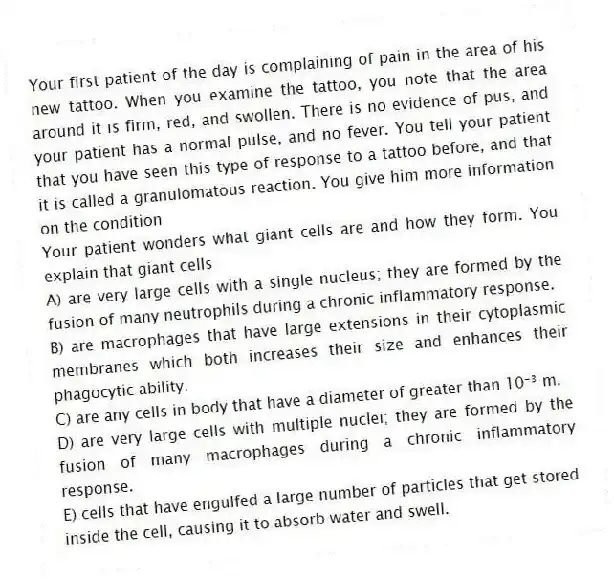
Your first patient of the day is complaining of pain in the area of his new tattoo. When you examine the tattoo, you note that the area around it is firm, red, and swollen. There is no evidence of pus, and your patient has a normal pulse, and no fever. You tell your patient that you have seen this type of response to a tattoo before, and that it is called a granulomatous reaction. You give him more information on the condition
-Your patient wonders what giant cells are and how they form. You explain that giant cells
A) are very large cells with a single nucleus; they are formed by the fusion of many neutrophils during a chronic inflammatory response.
B) are macrophages that have large extensions in their cytoplasmic membranes which both increases their size and enhances their phagocytic ability.
C) are any cells in body that have a diameter of greater than 10⁻³ m.
D) are very large cells with multiple nuclei; they are formed by the fusion of many macrophages during a chronic inflammatory response.
E) cells that have engulfed a large number of particles that get stored inside the cell, causing it to absorb water and swell.
Correct Answer:
Verified
Q79: Please identify the mismatched pair.
A) Kupffer cells-liver
B)
Q80: Please select the True statement regarding Toll-like
Q81: Which of the following is NOT a
Q82: Your first patient of the day is
Q83: Which of the following is NOT True
Q85: Your first patient of the day is
Q86: Your first patient of the day is
Q87: Your first patient of the day is
Q88: When microbes are introduced into normally sterile
Q89: Which of the following do you think
Unlock this Answer For Free Now!
View this answer and more for free by performing one of the following actions

Scan the QR code to install the App and get 2 free unlocks

Unlock quizzes for free by uploading documents